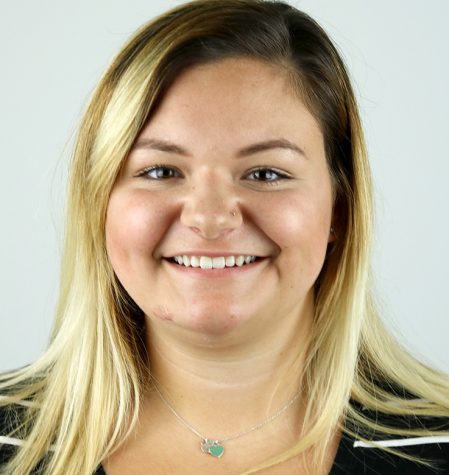TRiO, SACIS provide self-care tips to students
September 26, 2018
A self-care session, hosted by TRiO and the Sexual Assault Counseling and Information Service (SACIS), provided tips for how people can take care of themselves on Wednesday afternoon.
Taylor Diskin, social justice and empowerment services coordinator at SACIS, and Amanda Feder, director of prevention education at SACIS, led the session with a PowerPoint presentation.
The presentation began by defining self-care: what people do for themselves to establish and maintain health and to prevent and deal with illness.
Diskin said it is important for everyone to make time to engage in self-care.
“If you’re constantly stressing and frustrated, you’re only going to keep going further down this rabbit hole of being exhausted all the time,” she said. “Eventually, (you might) isolate yourself from your friends, and that can put you in a dark hole too.”
The presentation involved the benefits of self-care, including better productivity, improved resistance to disease, enhanced self-esteem, increased self-knowledge and the ability to give more.
Diskin said the five types of self-care include physical, emotional, social, spiritual and sensory, providing examples for each, including proper nutrition, sleep and exercise, positive self-talk, visiting with family and friends, listening to music and petting animals.
Feder said there is always time to schedule a little bit of self-care, even if it seems like one might be too busy.
“You have 24 hours in a day,” she said. “It’s just learning how to manage your time, which is hard as a student. We know that because we’ve been there, and we totally understand.”
A “body tune-up” occurred after the PowerPoint presentation, led by Diskin, where each person closed their eyes and focused on their bodies and paid attention to how they feel.
“(A tune-up) is great if you’re at work or maybe tensing up,” Diskin said. “You can take a minute to breathe.”
Feder said a tune-up is great because it works, and it is free.
Diskin said self-assessments are an important part of self-care too.
“(You can) assess your life and where you’re at in the moment,” she said. “It can also help you figure out what to work on next.”
Feder said after a self-assessment, a self-care plan should be put into place because it can help improve self-care and can help people figure out if their priorities need to be reorganized.
Diskin said she encourages everyone to try new things when it comes to self-care.
“Our bodies always change, and our needs do too,” she said. “Find what works for you. There’s no right or wrong way to do self-care.”
Feder said she does not think there can be too much self-care per person, but sometimes there may be other issues involved.
“I think if (self-care) is limiting you from doing your daily tasks, then that’s going to become an issue,” she said. “If you’re noticing a pattern with that, it might be more than just practicing too much self-care. It might be linked to anxiety, depression or just not managing time well.”
Feder said self-care is for everyone, regardless of gender identity or age.
“I would say it’s becoming a public health crisis that we’re not taking care of ourselves,” she said. “If you’re taking care of yourself, you’re going to be more productive. (Self-care) really does affect everything.”
Hannah Shillo can be reached at 581-2812 or hlshillo@eiu.edu.


















![[Thumbnail Edition] Senior Foward Macy McGlone, getsw the ball and gets the point during the first half of the game aginst Western Illinois University,, Eastern Illinois University Lost to Western Illinois University Thursday March 6 20205, 78-75 EIU lost making it the end of their season](https://www.dailyeasternnews.com/wp-content/uploads/2025/03/WBB_OVC_03_O-1-e1743361637111-1200x614.jpg)
















































